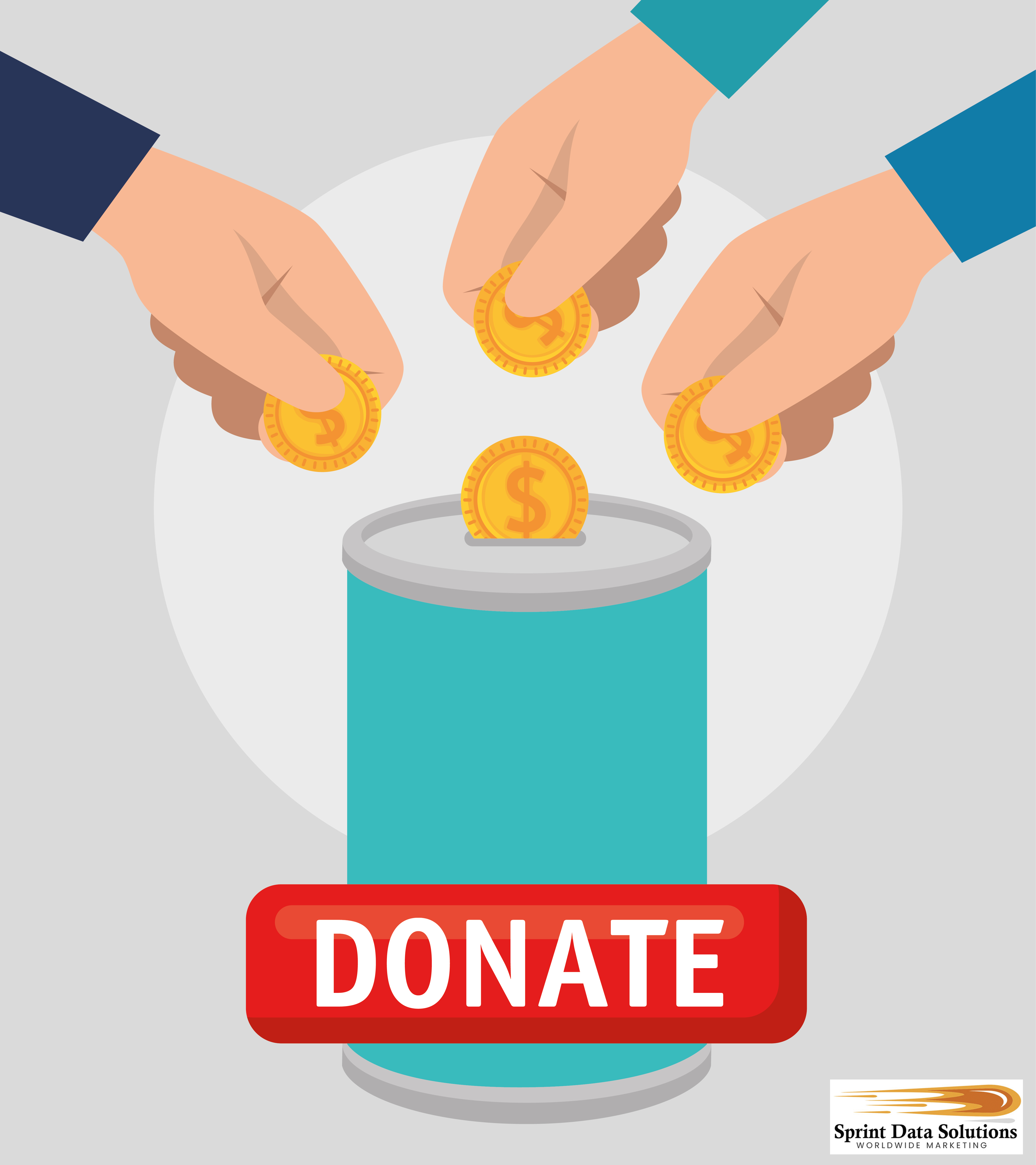The Best Way To Get The Most Donations Is To Find The Right Donors
One of the undeniable truths of life is that not every organized effort is designed to be profitable. In some instances, profitability may be unattainable because the focus is not on monetary gain but on making a meaningful impact. Charitable organizations are prime examples of this principle. These groups often come together, pooling financial resources, time, and effort for a cause greater than profit—whether it’s providing shelter and care for abandoned animals or offering underprivileged children access to quality education that can empower them to build a brighter future.
While these causes are unquestionably worthy and deserving of support, the reality is that they require funding to sustain their operations. Charitable organizations, unlike traditional businesses, don’t generate income through sales or profits. Instead, they rely heavily on donations to continue their vital work. Donations are the lifeblood of these organizations, enabling them to carry out their missions, provide services, and meet the needs of those they serve. Without generous contributions from individuals, corporations, and other entities, these noble efforts would struggle to survive, let alone thrive. Therefore, fostering a culture of giving is essential to ensuring that these organizations can continue to make a positive difference in the lives of those who need it most.

A Spectrum Of Worthy Causes
Charities have the unique ability to offer a wide range of causes that resonate with the diverse interests and values of the American public. From education and healthcare to environmental sustainability and social justice, there’s no shortage of initiatives that can benefit from financial support. While individual donations may seem small on their own, the collective impact of many contributors can lead to substantial change. Moreover, businesses and high-net-worth individuals also play a significant role in charitable giving, often dedicating a portion of their profits to support causes they believe in. This collaborative effort between individuals, corporations, and philanthropic organizations not only drives positive change but also fosters a culture of giving that strengthens communities across the nation. Whether through one-time contributions or ongoing support, charitable donations are a vital part of addressing the social and economic challenges that affect millions of people. Sprint Data Solutions Worldwide Marketing has a comprehensive list of donors for various causes, including:
Donor Mailing Lists
For those interested in identifying individuals and businesses that have donated to causes, regardless of the specific subject matter, we offer an expansive and diverse donor database. This comprehensive list includes a broad range of donors across all income levels, from individuals to organizations, ensuring that no matter the cause, you’ll have access to a wealth of potential supporters. Donors are spread throughout the country, and with our advanced filtering options, you can easily narrow down the list based on key metrics such as geographic location, demographic profiles, and more. Whether you’re looking to target donors in a specific region or focus on particular age groups, income brackets, or interests, our database allows for precise customization, ensuring that your outreach efforts are highly targeted and effective. This flexibility empowers you to connect with the right individuals and organizations, increasing the likelihood of securing contributions and driving the success of your fundraising campaigns.
Food Bank Donors
While most Americans aspire to have a stable income that can comfortably cover their living expenses—especially when raising a family—unforeseen events such as layoffs, natural disasters, or personal hardships can quickly turn a secure situation into a daily struggle. In these times, accessing basic necessities like food can become a daunting challenge, and many individuals and families find themselves unable to afford their next meal.
In response, there is a growing sense of compassion among people who understand these struggles, and many are eager to contribute in whatever way they can. Donating money, food, or time to food banks has become a powerful way for individuals to make a difference in their communities. Food banks, present in almost every major urban center, play a vital role in alleviating hunger by providing free or low-cost food to those in need. The decision of where to donate is often a personal one, as individuals and organizations choose the causes they feel most connected to, ensuring that food and financial contributions reach those who need them the most. Whether it’s a local food pantry or a larger regional operation, these resources help ensure that no one goes hungry due to circumstances beyond their control.
Homeless Shelter Donors
Homelessness, especially in large urban centers, has become an urgent social issue, particularly during harsh weather conditions like winter when individuals face the risk of illness, injury, or even death from prolonged exposure to cold temperatures. This vulnerability is compounded by a variety of complex factors that contribute to homelessness, including fleeing abusive home environments, untreated mental health conditions, and severe financial hardship. These situations are not confined to a specific region or group and can affect individuals in cities across the country, from major metropolitan areas to smaller towns.
While the reasons behind homelessness are multifaceted, shelters and community outreach programs play a vital role in offering temporary relief, providing access to resources, and helping individuals transition toward stable housing. These services offer a lifeline, helping people regain independence and re-enter society with the support they need to overcome the challenges they face. Many individuals and organizations are deeply committed to making a difference, with donations and volunteer efforts helping provide essential services and support. By working together as a community, we can help alleviate the hardships faced by those experiencing homelessness, offering not only immediate relief but also hope for a brighter future.
Animal Abuse Donors
Many Americans hold a deep affection for animals, and even those who don’t consider themselves avid animal lovers still tend to have positive attitudes toward them. This universal respect for animals contributes to a strong willingness to support causes that benefit abused or neglected animals. Whether through monetary donations or volunteer efforts, many people feel a personal connection to the welfare of animals, viewing their plight as equally heartbreaking as that of other vulnerable individuals, such as children or the elderly.
For pet owners, in particular, the idea of animal abuse can be deeply disturbing, as pets often hold a significant place in their lives as companions and family members. When these individuals become aware of the suffering animals face, it sparks an emotional response that compels them to take action. The result is an outpouring of generosity, whether in the form of donations to shelters, support for advocacy organizations, or hands-on volunteer work. This strong and compassionate response to animal welfare causes reflects a fundamental belief in protecting and caring for those who cannot speak for themselves. In a society where pets are often considered family, it’s no surprise that many are driven to support efforts to alleviate the suffering of animals in need.

Women’s Shelter Donors
While the pursuit of equality continues to be a central aspiration in America, the reality is that it remains unfulfilled for many, particularly women. Tragically, the prevalence of abuse disproportionately affects women, and the statistics surrounding this issue are staggering. For countless women, the only option to escape the cycle of violence is to leave their abuser, but this often comes with the difficult reality of limited resources and few safe places to turn.
In response to this pressing need, women’s shelters have been established as vital lifelines for those seeking refuge from abuse. These shelters provide more than just temporary housing—they offer a secure environment where women can begin the process of healing, rebuilding their lives, and breaking free from the grip of violence. They serve as sanctuaries where women can find not only a safe place to stay but also access to essential resources like counseling, legal support, and connections to long-term housing options. By offering a secure refuge, women’s shelters help prevent victims from returning to dangerous situations, allowing them the space to regain control over their lives and take the critical steps toward independence and recovery.
Emergency Disaster Donors
Natural disasters have the power to devastate entire regions, leaving behind destruction that often takes years to rebuild. From the raging forest fires in California to the frequent hurricanes that batter Florida’s coastline, the impact of these events can be catastrophic. Communities are torn apart, homes are lost, and lives are turned upside down. What makes these events particularly tragic is that they often affect entire populations who have done nothing to deserve such hardship. People find themselves displaced, not out of choice or circumstance, but because nature has taken everything from them.
During these harrowing times, individuals often face extreme challenges in simply meeting their basic needs, with entire communities struggling to survive. While natural disasters can strike anywhere, their scale and impact often overwhelm local emergency services, making it difficult for relief efforts to keep pace with the sheer number of affected individuals. The chaos is compounded by the fact that these events often occur suddenly, without warning, and may last for extended periods.
In the wake of such destruction, it’s common for those not directly impacted by the disaster to feel a strong urge to help. Americans across the country, recognizing the urgent need, often come together to donate funds, supplies, and other resources to support those in need. Others take a more hands-on approach by volunteering their time and effort, working tirelessly to provide aid and comfort to those who are suffering. This collective spirit of generosity is a testament to the resilience and compassion that defines the American response to disaster. By supporting these efforts, we can help ensure that survivors are not left to rebuild alone, and that their struggles are met with the solidarity and resources they need to recover and move forward.
Corporate Donors
Corporate entities, like individuals, can play a significant role in charitable giving, and they offer unique opportunities for nonprofits and causes looking to secure larger contributions. Just as wealthy individuals benefit from tax deductions for their charitable donations, corporations can also receive tax incentives for their contributions, making them valuable partners in fundraising efforts. When seeking substantial donations, corporations can be just as viable, if not more so, than private donors, especially when aligned with a company’s social responsibility initiatives.
Beyond monetary contributions, corporate donations can take many forms that might be even more valuable than direct financial gifts. Depending on the nature of the company, businesses may choose to donate products, services, or expertise that align directly with the needs of a particular cause. For instance, in the aftermath of a natural disaster like a hurricane, a food and beverage company’s donation of essential goods can be just as, if not more, impactful than cash donations. The immediate provision of food or supplies can help address urgent needs on the ground, making corporate contributions a vital component of a comprehensive relief strategy. By considering the broader potential of corporate donations, organizations can cultivate meaningful partnerships that deliver lasting impact and address specific challenges faced by communities.
Medical Donors
Medical treatment is an area where many Americans face significant challenges, particularly when they need urgent or life-saving care that is financially out of reach. Whether it’s an essential treatment that could prolong life or a procedure that can restore mobility and quality of life, many individuals are left grappling with the high cost of care. Moreover, unforeseen disasters can lead to families finding themselves in dire need of critical medical attention with no means to afford it, leaving many vulnerable.
This is where charitable donations can make a transformative impact. Americans are often incredibly generous when it comes to contributing to causes that can improve health and change lives. However, medical-related donations are a diverse field, and supporters have many options. Some may choose to donate to large organizations focused on pioneering research for serious illnesses like cancer, Alzheimer’s, or other debilitating diseases. Others may prefer to help individuals directly by supporting those in need of urgent medical procedures, surgeries, or treatments.
The realm of medical philanthropy is vast, encompassing various needs such as funding for rare diseases, accident victims, mental health support, and assistance for families struggling with long-term care. By donating, individuals can provide critical support to both established medical research initiatives and personal causes, making a tangible difference in the lives of those facing health-related hardships. Whether supporting systemic change or alleviating personal medical crises, the generosity of donors can create lasting impacts in the fight for better health and access to care.
Special Issues Donors
There are numerous instances where timely donations are essential to address both urgent and ongoing causes. Some situations may arise from immediate crises, such as children being trapped in dangerous locations where specialized equipment and resources are needed for a successful rescue operation. In these cases, the necessary funding not only supports the purchase of life-saving equipment but also ensures that rescue teams have the resources they need to remain operational and sustained throughout the mission.
Other causes are long-term and consistently require financial support. For instance, civil rights initiatives often need ongoing funding to combat prejudice, whether racial, sexual, or religious, especially when controversial events occur that highlight systemic inequalities. Additionally, many societal issues persistently call for financial backing, including advocacy for pro-life or pro-choice causes, as well as organizations that support or oppose gun control, climate change action, or other political and social movements. In all these cases, contributions are vital to maintaining momentum, providing services, and driving positive change in society. By supporting these causes, donors can make a meaningful impact on both immediate concerns and long-standing issues that shape the future.
Veteran Donors
Americans hold deep respect for the brave veterans who have selflessly served their country, often at great personal risk. These individuals have put their lives on the line to defend the freedoms we hold dear, yet, tragically, many face challenges when returning to civilian life. Despite their sacrifices, too often, veterans do not receive the support they desperately need. The trauma of war can create significant emotional, psychological, and physical barriers, making it incredibly difficult for them to readjust to life outside of the military.
For many, the journey to healing involves overcoming invisible wounds that may not always be understood or addressed. Whether it’s financial aid, mental health support, or spiritual guidance, the assistance these veterans require is not always readily available, leaving them to navigate their struggles alone. In some instances, the very systems designed to help them fall short, creating a painful disconnect between the service they provided and the support they receive.
However, there are still many compassionate Americans who recognize the importance of honoring these heroes beyond just words of gratitude. They understand that veterans require more than recognition—they need tangible support. Through donations, charitable efforts, and organizations dedicated to their well-being, these individuals provide vital resources to help veterans heal, reintegrate into society, and rebuild their lives. By contributing to these causes, they play a crucial role in ensuring that veterans are treated with the dignity and respect they deserve, ultimately helping them reclaim their place in the communities they helped protect.
COVID-19 Donors
The COVID-19 pandemic has left an indelible mark on the world, drastically reshaping the way businesses operate and how individuals go about their daily lives. The ripple effects of the crisis have extended far beyond immediate health concerns, affecting not just those who contracted the virus but also others who have experienced long-term disruptions due to the pandemic. While the immediate threat of COVID-19 may have subsided, its legacy continues to impact millions.
Over a million Americans have tragically lost their lives to COVID-19, and even more have experienced lingering, debilitating effects. Among the most concerning of these is “Long COVID,” a condition in which individuals continue to suffer from chronic symptoms long after the initial infection has passed. These symptoms can include severe fatigue, shortness of breath, and cognitive impairments such as “brain fog,” which affects memory, focus, and the ability to think clearly. For many, these lingering effects have made it impossible to return to their previous lifestyles or work. As a result, individuals who were once productive members of society now find themselves unable to contribute in the same way, requiring support and assistance to navigate this new, challenging reality.
The ongoing impact of Long COVID represents a significant challenge, not just for those affected but also for the broader workforce and society. Those living with the condition are often forced to adjust their lives and rely on various forms of support to cope with the challenges that come with it. This pandemic-induced shift highlights the urgent need for continued compassion, understanding, and resources to help those who are struggling to regain their quality of life.
Paralysis Donors
For many Americans, the loss of mobility is a profound challenge that can alter their entire way of life. This loss may stem from a variety of causes, including congenital conditions, debilitating illnesses, or traumatic accidents. In less severe cases, individuals might experience partial paralysis, where some areas of the body, like the fingers or toes, lose function. However, more debilitating forms of paralysis, such as paraplegia and quadriplegia, can be life-altering.
Paraplegia leaves individuals unable to move their legs and typically requires the use of a wheelchair for mobility. In more extreme cases, quadriplegia results in the loss of both arm and leg function, often leaving the individual dependent on a bed or specialized equipment for basic care. These individuals face not only physical limitations but also significant financial burdens as they navigate a world that is not always accessible or designed with their needs in mind. The costs of medical care, daily assistance, and specialized equipment can quickly exceed their financial resources, leaving them vulnerable. For many, charitable donations can be the critical difference between being able to access life-saving care or struggling to survive without the support they need. These donations can help ensure that paralyzed individuals maintain a basic standard of living, including access to food, medical treatment, and the means to live with dignity.
Special Olympics Donors
The traditional Olympics showcase the extraordinary achievements of athletes who push their bodies to the limit, excelling in ways that seem beyond human capabilities. The Special Olympics, while similarly celebrating athleticism, highlight the resilience of individuals overcoming far more profound challenges, including physical and mental disabilities. These athletes don’t just break records; they defy the limitations imposed by their conditions, showcasing determination and spirit that inspire the world.
From events tailored for those with intellectual disabilities to wheelchair basketball competitions, the Special Olympics provides a platform where individuals who face severe challenges can shine, demonstrating perseverance and talent in ways that often go unrecognized in daily life. Despite this incredible display of strength and courage, the Special Olympics often receive less media attention and funding than the traditional Olympics, making donations crucial for sustaining and growing these events. Many Americans are eager to support this cause, recognizing the transformative power of sport for individuals who might otherwise be overlooked. By contributing, you help ensure that these athletes continue to have the opportunity to compete, inspire, and break barriers, both on and off the field.
Children’s Lunch Program Donors
It has long been emphasized that children represent the future of any nation, and quality education plays a vital role in shaping their potential. However, a critical element that is often overlooked is proper nutrition. It’s impossible for children to focus on learning if they are distracted by hunger, and for many families facing financial difficulties, providing daily meals becomes a challenge. These families often have to prioritize expenses like rent and utilities over consistent access to nutritious food, putting children at risk of inadequate nourishment.
School lunch programs and community organizations that provide meals to children in need are essential in bridging this gap. These programs help ensure that children can access healthy and fulfilling meals during the school day, enabling them to stay focused and perform at their best. However, these programs often face significant financial challenges, requiring funding to purchase fresh ingredients, staff meal preparation, and logistical support. Donations play a crucial role in sustaining and expanding these efforts, providing the necessary resources to support children’s nutritional needs and helping to reduce the burden on families who are already struggling. By supporting these initiatives, we can work together to ensure that every child has the opportunity to thrive academically and grow in a healthy environment.
Unwed Mother Donors
While many Americans continue to hold the traditional nuclear family in high regard, the reality is that many women, often through difficult and sometimes traumatic circumstances, find themselves raising children on their own. The impact of abusive relationships, or even worse, instances of rape, can leave women to face the immense responsibility of motherhood without the support of a partner. Raising a child under any circumstance is a significant challenge, but doing so without help, particularly when trauma is involved, can feel overwhelming and isolating.
Despite these hardships, there is a growing recognition within the American public of the need to support these women and children. Many people believe that every child, regardless of the circumstances of their birth, deserves the opportunity for a bright future. For mothers in these situations, financial assistance and community support can make all the difference, offering them the resources and opportunities needed to provide a stable, loving environment for their children. Donations aimed at supporting unwed mothers can have a profound and lasting impact, not only on the lives of these women and their children but also on the broader community. Helping these mothers fulfill their role as caregivers gives their children the chance to grow up in an environment where they can flourish, contributing to a more compassionate, supportive society that values the well-being of all its members.
Church Donors
Religion continues to play a significant role in the lives of many Americans, with a diverse landscape of faiths across the nation. Christianity remains the predominant belief system, but within it, there is a rich diversity, ranging from long-established denominations like Catholicism and Protestantism to newer forms of American-born religious movements, such as evangelicalism and Mormonism. Beyond Christianity, the United States is also home to a wide variety of non-Christian faiths, including Judaism, Islam, Buddhism, and Hinduism, which all contribute to the country’s spiritual and cultural tapestry.
Each of these religious groups often has associated charitable organizations that are dedicated to various causes, from social justice to disaster relief, education, and healthcare. These charitable efforts rely heavily on donations, with many Americans expressing a deep commitment to supporting their own faith or religious community. However, the challenge lies in effectively connecting the right donors with the religious institutions and causes that align with their beliefs. This is where targeted marketing strategies come into play, ensuring that the charitable efforts of religious groups reach the appropriate audience, fostering a strong sense of support and alignment. By recognizing the diverse religious landscape and understanding the unique needs of each group, businesses and charitable organizations can strategically position their campaigns to inspire meaningful donations and create a lasting impact.

How We Can Help
Sprint Data Solutions Worldwide Marketing provides a comprehensive range of contact information across multiple channels, allowing you to customize your marketing campaigns with precision. Whether you’re looking for mailing addresses, phone numbers, business contacts, or email addresses, we can deliver exactly what you need. For modern campaigns utilizing text/SMS marketing, we also offer cellular phone numbers, expanding your reach through the latest communication methods.
Our database allows for seamless organization based on geographic targeting, making it easy to structure your campaigns from a national scale down to a single neighborhood. We offer robust options for demographic segmentation, allowing you to filter contacts by gender, age, ethnicity, economic status, religious beliefs, and even donation preferences. For example, if your focus is on charitable donations, we can provide targeted lists based on interests like child-focused or animal-based causes.
No matter the size or scope of your campaign, Sprint Data Solutions Worldwide Marketing offers highly specialized donor lists and marketing data tailored to your specific needs. Whether you’re looking to reach a broad audience or a highly targeted group, we have the tools and expertise to help you succeed. Contact us today to discover how we can support your marketing goals with the most accurate and detailed contact information available.






